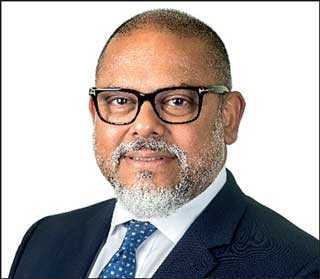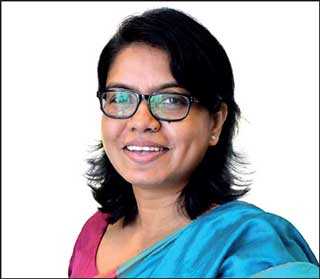Monday Feb 23, 2026
Monday Feb 23, 2026
Tuesday, 5 November 2019 00:00 - - {{hitsCtrl.values.hits}}
The Employers’ Federation of Ceylon (EFC) will unfold its 8th edition of the annual symposium on the theme ‘An Agenda for Change’ on 8 November at the Cinnamon Grand Hotel, creating a platform for the employers, employees and also policy makers to deliberate on how best ‘change’ could be
 |
Sarinda Unamboowe |
 |
Pulasthika Wirasinha |
championed for sustainable business.
Professionals representing multiple sectors will share their expertise on three key areas of ‘Social Dialogue and Building Trust’, ‘Sustainable Enterprises’ and ‘Shifting Paradigms of the Workplace’. The dialogue will be facilitated though panel discussions and case studies.
MAS Kreeda CEO and Managing Director Sarinda Unamboowe, a panellist who will lend voice to Session 3 of the Symposium under the banner ‘Shifting Paradigms of the Workplace: Emerging Forms of Work and Managing Stakeholder Aspirations,’ remarked that labour and social support policies will need to recognise different forms of work arrangements and incentivise both employers and employees to learn new skills and recognise non-traditional forms of learning and upskilling in a world driven by digital interventions. The effort in this regard should necessarily be a collaboration between the state and the private sector, said Unamboowe.
The senior professional who counts a wealth of experience in the apparel sector further averred that despite the sector being the largest contributor to the economy in terms of export revenue, apparel is seeing a constant decline in its appeal to the labour force. “Particularly female participation is persistently declining and unless the sector embraces modernised manufacturing methods and flexible working environments, this battle cannot be won.”
In terms of bridging the gap between the management and the workforce in any organisation, the role of communication cannot be underpinned, said Unamboowe who alluded to consistent, clear and constant ‘two-way communication’ which will foster inclusivity across the board. “We often under-communicate as management which I perceive to be the biggest contributor to the gap. Thus, there is a collective responsibility on employees too to speak up to be open and contribute to the corporate initiative.”
Embracing a work force that is diverse in terms of differently-abled persons, gender, ethnicity, and cross-generational is the only way Sri Lanka will be able to meet labour demand in the future, observed Unamboowe. “This will require a two-way strategy – public sector efforts in terms of policy frameworks and incentives, and private sector investment to recognise new types of work arrangements that encourage non-traditional ways of learning and use of technology that supports both autonomation and collaboration at higher levels.”
London Stock Exchange Group, Sri Lanka Head of HR Pulasthika Wirasinha, who is also among the notable panellists of Session 3 of the Symposium, remarked that economic and labour policies should not be looked at in isolation. She also pointed out that there should be an aspiration to align policies towards the next level of digital interventions rather than to fill the current gaps if we are to be on par with the rest of the world.
“When drafting future polices we need to be mindful to take advantage of the digital evolution that will be around education, as the AI /AR are skill-based technologies rather than process-based. Moreover, policy makers should take stock of R&D, infrastructure, taxation, social security polices, employment regulations, etc. When these aspects are revised keeping the future in mind, the economic and labour polices will automatically fall in line.”
The law, as Wirasinha illustrates, should provide a guideline to manage the ‘individual’ rather than the law in general. “The partners of national economy and productivity are many, including women, single parents, ageing workforce, millennials and the differently-abled. The law should be inclusive of all these cohorts and offer adequate flexibility within a broader legal framework towards greater productivity, offering solutions towards individual needs of all these dynamic groups,” said the senior professional who went on to note that there is always opportunity for the employers to offer more than what is governed by the law. Citing crèche facilities, lactation rooms, flexible hours of work and mindset change programmes as some of the examples, she remarked that such interventions could forge a workforce culture driven by trust and care.
Retaining talent in a small market such as ours becomes a significant challenge, observes the senior HR Manager who calls for creating and nurturing pools of talent spurred by emotional connectivity between the employers and the employees. “With talent pools becoming extremely complex and diverse with individualistic expectations and drivers, organisations should at all times have the flexibility to manoeuvre in their polices for better results,” she noted.